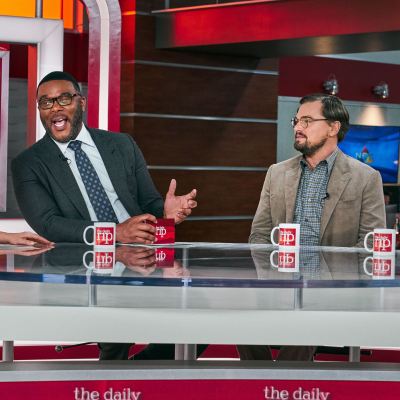Don’t Look Up: Who Are the Characters Based On
We examine the real life parallels for the depressingly believable ensemble of nitwits in Adam McKay’s Don’t Look Up.

The following includes major Don’t Look Up spoilers.
This was supposed to be a comedy, right? That’s what the marketing and 1960s-inspired opening title cards suggest for Adam McKay’s Don’t Look Up, and yet one might think the happiest moment in the whole thing is when Leonardo DiCaprio’s Dr. Randall Mindy and Jennifer Lawrence’s PhD candidate Kate Dibiasky sit down to dinner with family, friends, and even a new fiancé, before the comet strikes. At least they’re getting a break from trying to force reality into those people’s thick skulls.
That’s the bleak vibe and pitch black humor at work throughout Don’t Look Up, a passionate, strident, and intentionally abrasive dramedy which takes a page out of Stanley Kubrick and laughs at the end of the world. The film is clearly meant to be a parable about humanity’s inability to face the hard truths of the existential threat posed by climate change in the last 40 years, but it also arrives deep into the second year of the COVID-19 pandemic (and new emergence of the Omicron variant). While McKay wrote and began preparing this project before COVID, it all lands a little more horrifyingly now… not least of all because the film’s most caricatured personalities all have the haze of truth around them.
Indeed, the movie is technically a fictional story, just as it’s supposedly a comedy, but the fact that there are echoes of the real world in each larger than life cartoon character allows it to play differently. So here are all the winks, allusions, and implications we caught on our first viewing.
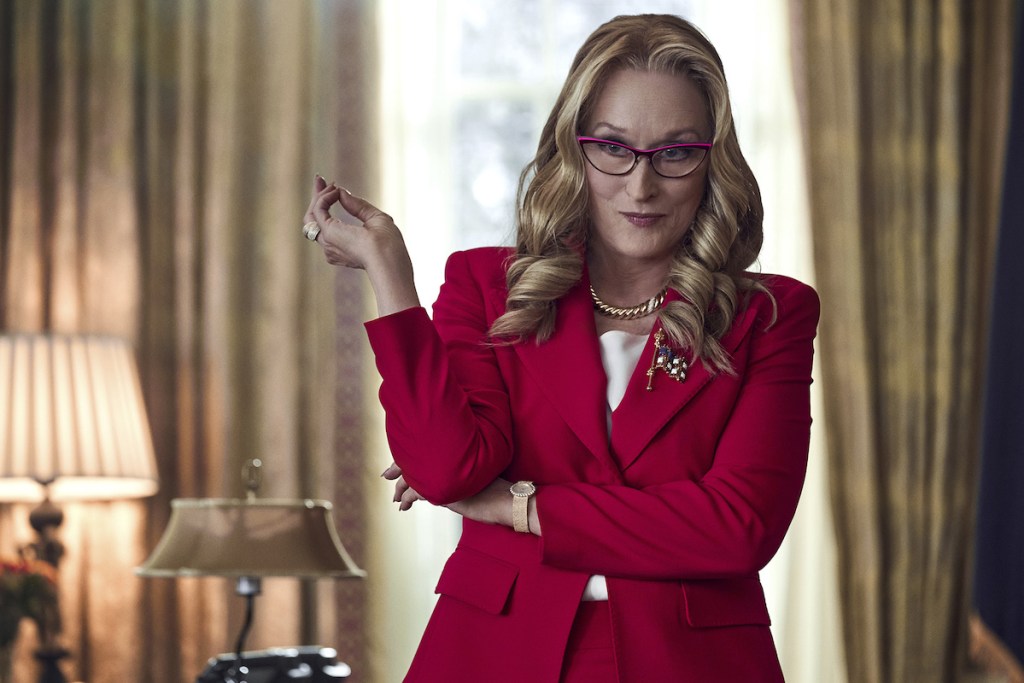
Meryl Streep’s President Orlean Influences
When the Don’t Look Up trailer first dropped, you would be forgiven for thinking that there are hints of Hillary Rodham Clinton, the woman who almost was the President of the United States, in Meryl Streep’s blonde female POTUS with a penchant for pant suits. And that’s because, truthfully, there are multiple nods and references to all of our most recent national leaders in Streep and McKay’s unholy creation. But the figure she’s clearly most emulating is the orange hued man who was president when cameras first rolled on the movie: Donald Trump.
Like Trump, Orlean is a former reality television star who preposterously rose to national politics and is vocally outspoken in her anti-intellectualism and anti-science ignorance. Just last year, as Don’t Look Up was preparing to film during the pandemic, Trump told Wade Crowfoot, California’s secretary for natural resources, that he thought the earth was going to “start getting cooler – you just watch.” When Crowfoot responded that he wished the science agreed with the president, Trump added, “Well, I don’t think the science knows, actually.”
The former president made these incredulous assertions as California was ravaged by historic wildfires—and in the same year the former president also told Americans that COVID-19 was “a hoax” exaggerated by the DNC and that it would go away in spring 2020 “like a miracle.” Orlean’s similar disinterest and inability to engage in reality is a maddening recreation of this, as is her abuse of cronyism and nepotism, including by making her son White House chief of staff.
But she is not only Trump. Take her bizarre crisis at the start of the film where she’s nominated an abusive, violent, and racist southwestern sheriff with no judicial experience to be a justice on the Supreme Court. The small character of the sheriff (who we’ll come back to) is likely inspired by Joe Arpaio, a former sheriff in Arizona whom Trump pardoned in 2017 after the law officer was found guilty of criminal contempt. While Trump did not nominate Arpaio to the SCOTUS, President George W. Bush—whose administration is a favorite subject matter for McKay—did attempt to put Harriet Miers on the Supreme Court in 2005.
Up to that point, Miers had been a lifelong political animal in the Republican Party who had never served as a judge on any court. But she had worked in the Bush White House as first a staff secretary and then deputy chief of staff for policy. Her close loyalty to Bush caused the president to nominate her over anyone who actually served in the judiciary. The choice received fierce backlash from even the Republican Party. After meeting with the Senate Judiciary Committee in 2005, then-Sen. Tom Coburn privately said she “flunked” in demonstrating the intellectual rigor needed to be a SCOTUS justice.
Miers ultimately withdrew her nomination. It was one political humiliation for Bush who suffered many after his reelection, including how poorly his “Mission: Accomplished” photograph atop of an aircraft carrier had aged as the Iraq War escalated. Don’t Look Up appears to mimic this with Orlean deciding to take the comet “seriously” for political expediency and having a preemptive victory speech given from atop an aircraft carrier in the Potomac.
Streep’s President Orlean similarly merges elements of other political figures across the spectrum, from the fact she’s seen in one photograph hugging former President Bill Clinton, and somewhat copying his folksy mannerism, to her oft-discussed smoking habit, which she initially tried to hide on the political campaign trail. This, in turn, mimics former President Barack Obama’s worst kept dirty little secret. Also like Obama, she has a habit of being photographed with celebrities. Obama also had a tendency to trust the experts who came from Ivy League schools as most credible, much to many on the left’s disdain when it came to appointing conventional Harvard thinkers like Larry Summers as Director of the White House National Economic Council during the Great Recession.
Even her earliest “scandal” as a woman who, according to her son, became famous for being a Playboy centerfold back in the day feels like a play on former Sen. Scott Brown of Massachusetts, the Republican politician who shocked the political elite when he captured Ted Kennedy’s Senate seat following Kennedy’s death in 2009—and in spite of the fact that his nude centerfold spread in Cosmopolitan magazine was dredged up during the campaign.
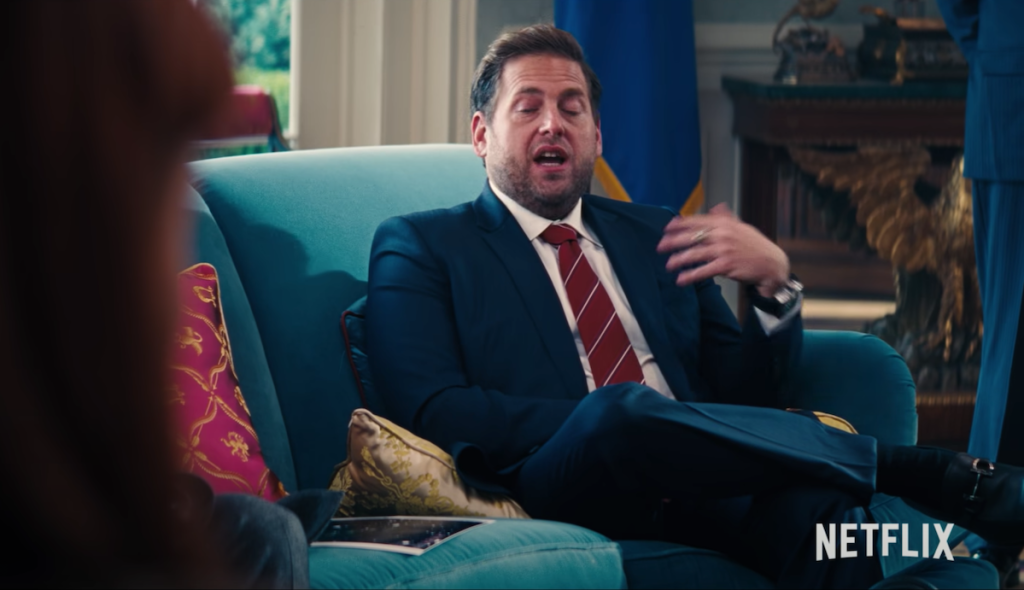
Jonah Hill’s Jason Orlean Inspirations
On balance, Jonah Hill’s character in Don’t Look Up is nothing short of a Frankenstein’s Monster styled stitching of the reputations and rumors around Jared Kushner, Ivanka Trump, and Donald Trump Jr.
Introduced first as President Orlean’s entirely disinterested and arrogant White House chief of staff, we eventually learn Jason is her actual son. While President Trump never quite had the audacity to appoint one of his children (or their spouses) as his chief of staff, according to various reports about the Trump White House, he might as well have. Particularly during the first year-plus of the Trump presidency, reports consistently described Trump’s son-in-law, Kushner, and his daughter Ivanka as leaders of a competing White House apparatus that worked in opposition to Trump’s first failed chief of staff, Reince Priebus.
While their roles in managing the presidency allegedly faded some in later years, the son-in-law remained President Trump’s go-to fixer and idea man. During our own real life Don’t Look Up experience in 2020, Trump appointed Kushner to oversee much of the federal response to COVID-19 in the spring, despite his son-in-law’s absolute lack of experience in handling viruses, pandemics, or national emergencies.
More damning still, reports came out alleging Kushner’s team spent months coddling the president’s political desire to downplay the virus by coming to the conclusion that “because the virus had hit blue states hardest, a national plan was unnecessary and would not make sense politically.” One anonymous expert was quoted as saying, “The political folks believed that because it was relegated to Democratic states, that they could blame those governors, and that would be an effective political strategy.”
According to Stephanie Grisham, a former Trump White House press secretary, Kushner and Ivanka “thought they were a shadow president and first lady.”
Don’t Look Up also leans into the salacious rumors and stories about the Trump kids. This ranges from the much remarked upon obsession the former president had with commenting on his daughter’s attractiveness (it’s reversed in the movie) to the social media speculation about Donald Trump Jr.’s supposed use of recreational drugs (which became so intense after his 2020 RNC speech that he had to publicly deny them).
Jason Orlean certainly mimics Don Jr.’s role as being his presidential parent’s social media attack dog, right down to still tweeting about his inherent awesomeness after he’s become the last man left on Earth.
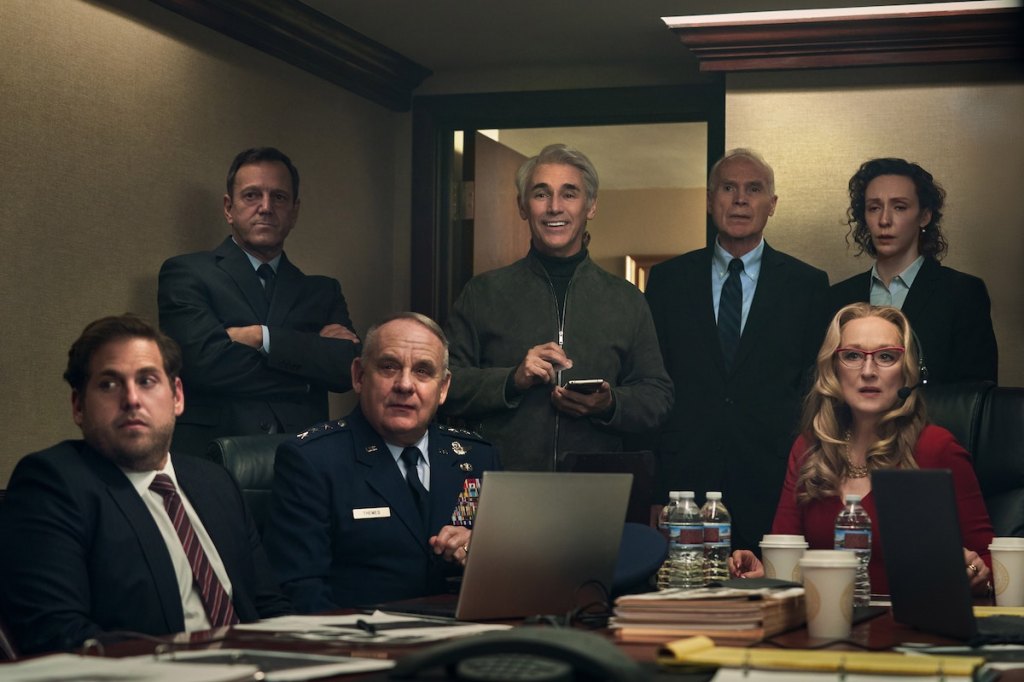
Mark Rylance’s Peter Isherwell Influences
Another unsubtle blending of various public figures, although now from the world of tech and energy, is Mark Rylance’s deluded CEO. Rylance has played tech CEOs with god complexes before, quite memorably so during Steven Spielberg’s Ready Player One (2018). But whereas that film leaned into the mythical way some of Silicon Valley’s leading capitalists might view themselves (and how their fans did back in the late 2000s, when the source novel was written), McKay asks Rylance to repeat his soft-spoken and gentle obliviousness to a far more menacing effect.
In this film, Rylance is the CEO of a company that looks a lot like Apple given the almost religious awe consumers and even children hold for him and the new smartphones he releases every year. In this way, he obviously looks a lot like Steve Jobs, whose cult of personality never seemed greater than when he introduced the world to the iPhone in 2007.
However, beyond the fact that Jobs is gone and was never a major political mover and shaker, Isherwell also combines elements from other recent tech gurus, including most obviously Elon Musk, the CEO and product architect of Tesla, Inc., and founder, CEO, and chief engineer of SpaceX. Like Isherwell, Musk is an arguably chilly presence who fancies himself as something akin to mankind’s savior with his determination to lead SpaceX to colonize Mars, complete with its own direct democracy government, and who believes our future is “among the stars.”
The way that he uses his cellphones to track and datamine folks to the point where he thinks his algorithms can predict the very cause of your death is also the open dirty secret of so many tech companies in the 21st century, but most clearly Facebook, which is now part of the rebranded “Meta” company run by CEO Mark Zuckerberg.
Like Isherwell, the near worshipful affection tech watchers had for Zuckerberg, Facebook, and social media at large in the late 2000s has given way to cynicism and despair after those tools have proved to be a breeding ground for misinformation, manipulation, and political destabilization. In fact, just this year a former Facebook employee testified before the U.S. Senate that the company allegedly put profits above public safety when it came to vetting (and ignoring) algorithms that ultimately may promote radicalization.
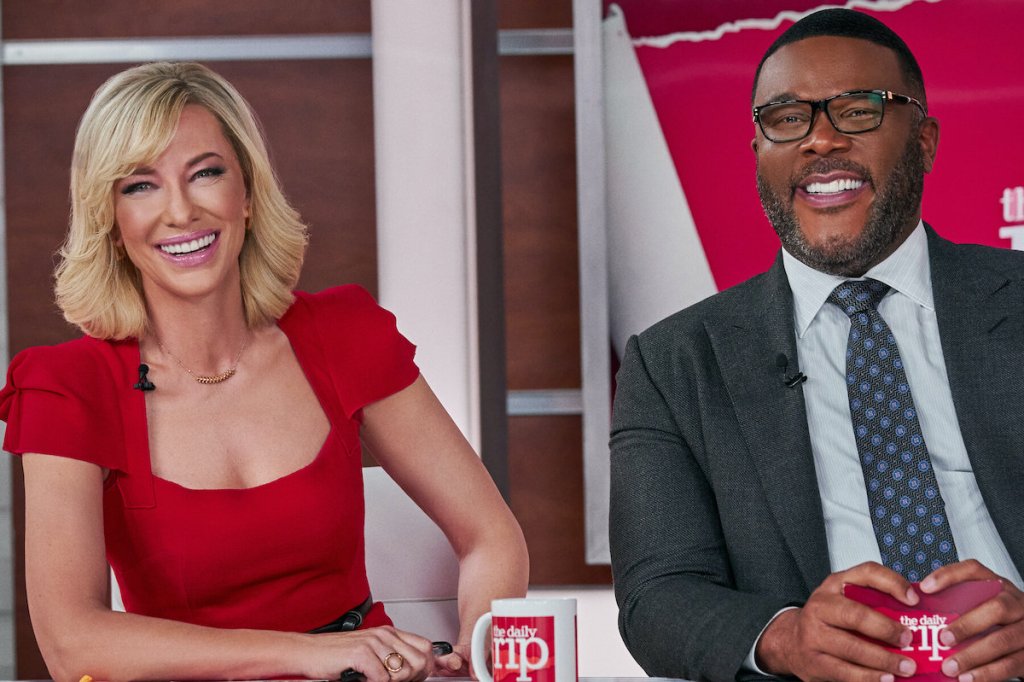
Cate Blanchett’s Brie Evantee and the News Media
Cate Blanchett appears nigh unrecognizable beneath her airbrushed cheshire grin as Brie Evantee. The character, alongside Tyler Perry’s Jack Bremmer, is part of a pair of stand-ins for almost any cheerful-to-a-fault morning show personality. However, the specific look of Brie, and Blanchett’s discreet underplaying of extreme intelligence beneath the mind numbing banter, suggests she is modeled after Mika Brzezinski, the co-host of MSNBC’s Morning Joe.
Like Evantee, Brzezinski co-hosts the morning show which is ostensibly a little savvier and certainly more popular with Washington politicos and beltway insiders. Also like the fictional character, Brzezinski is a lot sharper than the usual sing-songy morning blather might indicate, with Brzezinski being a visiting fellow at the Harvard Institute of Politics and a former on-the-ground reporter, including when she was CBS News’ principal “Ground Zero” correspondent during the September 11, 2001 attacks.
This specific comparison was raised to McKay during a profile interview in Vanity Fair. He denied the similarities though, suggesting they were purely coincidental. He did, however, more openly discuss comparisons to larger institutions instead of individual persons. McKay thus admitted his film’s New York Herald is a satire of the high-minded airs of The New York Times.
“I do think tremendous shame on The New York Times for hiring that climate change denier,” McKay is quoted as saying in reference to Bret Stephens. He went on to say the paper of record is too beholden to its own vaunted sobriety and doesn’t treat climate change with the urgency it deserves. He added, “[But if you’re a top editor at the paper] are you really going to go into a meeting and go like, ‘Hey guys, I think we should put a headline that says, We’re fucked.’”
And Michael Chikilis’ cameo as a Fox News-like sycophant for the right is clearly modeled after Sean Hannity, as indicated by the logo behind him on his last night on Earth… which he spends by ignoring the hard cold reality of a comet about to crash on his head. With that said, he could just as easily be any Fox News personality who denies climate change or the magnitude of the Jan. 6 insurrection mob which descended on Capitol Hill.
Erik Parillo’s Sheriff Conlon Inspirations
Sheriff Conlon, President Orlean’s Supreme Court pick and the man she also appears to have a romantic fling with, is likely based on Joe Arpaio, the controversial and disgraced former Sheriff of Maricopa County from 1993 to 2017. During his tenure, the sheriff and his office received numerous accusations of politically motivated investigations and arrests (including of journalists), abuse of power, misuse of government funds, and (in what made him a Fox News hero) the targeting if Latinx communities in search of undocumented immigrants. This included “immigration patrols” which canvassed largely Latinx communities and which would stop Latinx drivers and ask for identification.
A judge specifically ordered the racial profiling in the last abuse to end, which Arpaio ignored, causing the judge to hold Arpaio in criminal contempt of court.
Trump pardoned Arpaio less than a month later.
I also got faint hints of disgraced former congressman and Democrat, Anthony Weiner, with how his salacious texts were leaked online, not unlike Weiner’s various sexting scandals repeatedly finding their way into the press, destabilizing the political campaign of Hillary Clinton in 2016, which his then-wife worked for.
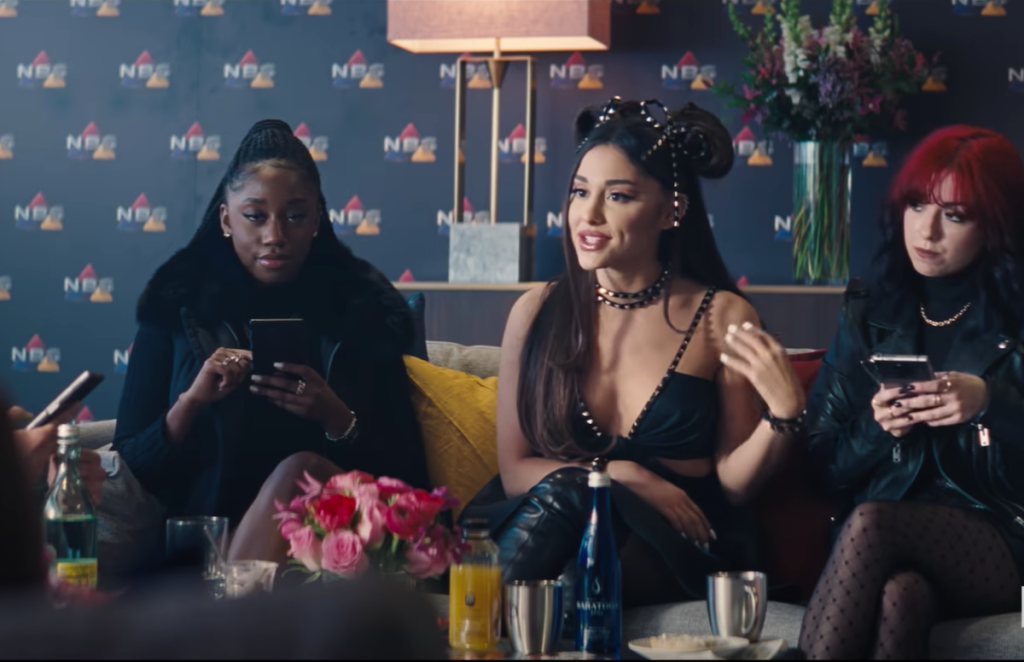
Ariana Grande’s Riley Bina Inspirations
Oh, come on, do you really need us to explain this? Ariana Grande is a good sport for playing a caricature of herself in Don’t Look Up. The Grande pop star in the movie is named Riley, and she lives in a world where her love life is part of her public persona due to invasive media interest–which she plays the game over all too well. Thus scenes of her on a morning show where the press is more interested in talking about her bad break-up from another pop star instead of her music—never mind the planet-killing comet coming from above.
Grande has of course had notable break ups with popular musicians and an SNL star. If you want to read more about that, use Google for that sort of thing.
Don’t Look Up is streaming now on Netflix.


